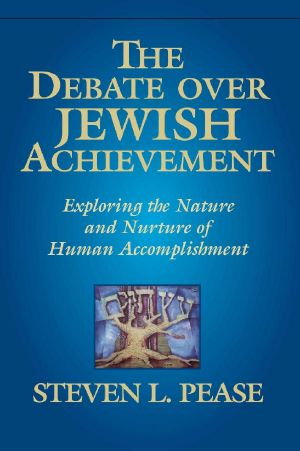The Debate Over Jewish Achievement · Exploring the Nature and Nurture of Human Accomplishment

- Authors
- Pease, Steven
- Publisher
- Deucalion
- ISBN
- 9780982516843
- Date
- 2015-01-28T00:00:00+00:00
- Size
- 1.97 MB
- Lang
- en
"Properly, the Jew ought hardly to be heard of, but he is heard of, has always been heard of. He is as prominent on the planet as any other people, and his commercial importance is extravagantly out of proportion to the smallness of his bulk. His contributions to the world's list of great names in literature, science, art, music, finance, medicine, and abstruse learning are also away out of proportion to the weakness of his numbers ..." -- Mark Twain, "Concerning The Jews" Harpers, 1899 This may well be the best book ever written about why Jews have been the world's most disproportionate high achievers of the last two centuries. What Steven L. Pease did in 2009 with his book The Golden Age of Jewish Achievement - an exhaustive 624-page compendium - has been more than matched by The Debate Over Jewish Achievement, a thoughtful, balanced and ultimately astounding exploration of the "why" behind the "what" of Jewish achievement. Pease traces more than 100 years of major theories put forth to explain the phenomenon, using the technique of a Chronology to expose the strengths and flaws of each theory over time. He puts nature (genetics) and nurture (Jewish culture) under an unrelenting microscope, drawing on recent research into the impacts of culture as well as the breakthroughs in genetics following completion of the Human Genome Project. Some of that research has established, beyond any reasonable doubt, the genetic heritage and linkages between most of the world's Jews dating back thousands of years: the Ashkenazim, Sephardim, Mizrahim and others. Pease also explores how new ways of thinking, such as epigenetics, are moving beyond conventional genetics to present new insights into how nature and nurture may interact to shape what we become. While Pease invites readers to keep an open mind during the "time travel" of his Chronology, he himself comes down firmly on the side of culture as the most important driving influence behind Jewish achievement. And he is forthright about what he sees as the critical lessons to be gleaned from Jewish achievement, as they relate to us all.